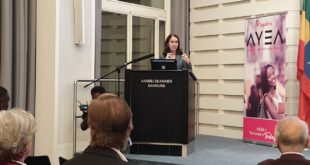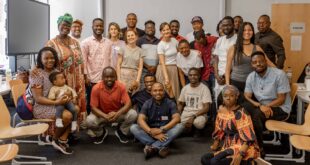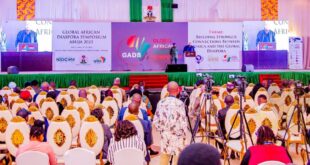Young and not-so-young Nigerians are leaving the country in droves. And the emigrants are educated citizens who possess the knowledge and skills that their homeland needs for its development. How can we turn this brain drain to brain gain? US-based Oluwatoyin Ajilore-Chukwuemeka, scholar and social entrepreneur specialising on the convergence of education, entrepreneurship, policy and development, proposes ways Nigeria can better integrate its diaspora into national development, using the example of its education sector.
——–
It is no news that the wave of emigration of Nigerians, aka Japa , is growing stronger. Japa has had ahuge impact on almost all sectors of the Nigerian economy. For example, it is estimated that about2,000 doctors leave Nigeria annually.

For this article, I will concentrate on the effects of Japa on the education sector. Education is one sector that has been most hit, with increasing numbers of students abandoning Nigeria’s tertiary education systems for greener pastures abroad. In 2022, the data from the British government shows about 800% increase in Nigerians granted study visas compared to 2019.
The current public debate has been focused mostly on how Japa is evoking brain drain in the country. But what if we take a long look at it from a different perspective? What if there could be some positive intellectual dimensions to this? What if we could have some brain gain too? Are there ways we might leverage the strength of diaspora towards progressive returns?
Call me optimistic but I believe there is always an upside to every situation. Rather than crying over spilled milk and trying to fight the inevitable as it is currently being done in some corridors of power about this issue, it might be time to embrace the movement and restrategize on how the nation can also benefit from it. It doesn’t have to be a win-lose situation between the individual and the nation. How to make Japa a win-win situation is my goal for this article.
Here are a few starting ideas on how the education side of Japa particularly can lead to some brain gain:
Research Focus on Africa
Graduate students abroad can focus their research on Africa. With this, they contribute to strengthening the knowledge base needed to develop the continent. I have written in a previous article about the importance of Africa-based research in the socioeconomic development of the continent in every sphere.
If students have to leave because of the lack of resources to do their research, the country can still benefit from their work if there is at least some form of focus on the continent. This is not going to be so difficult to do seeing how the globalised world is showing heightened interest in Africa.
Their research can become useful tools in the strategic move towards national development.
Strengthening human capital
The rise of digital communication has made information sharing easier regardless of location. Japa people can contribute to strengthening the human capital in the nation and continent at large through various forms of information-sharing.
There are already examples of this happening on small scales. From a growing person-to-person human capital strengthening happening between youths abroad and youths back home through mentorships, to more institutionalized forms like the Ife Insitute of Advanced Studies (IAS). IAS, founded by the Nigerian-American Professor Jacob Olupona, is a hub that provides professional development opportunities for Nigerian local researchers at no cost.
More forms and informal channels that can help strengthen human capital like this can be created.
Strengthening financing
Emigrated Nigerians can help strengthen national finances in many ways. A quick example is remittances, which have now been shown to be a leading form of forex revenue in Nigeria. Another way is to institute scholarships. Etc. The scholarships do not even have to be large funds. The little ones count too.
For example, there is a growing number of diasporan funds going towards social impact work like paying schools for indigent students locally. The government can look into ways to make these kinds of contributions grow by incentivizing the givers.
Japa does not have to be a brain drain. We can gain too. We should gain too.
Oluwatoyin is a Doctoral Researcher in STEM Education, Social Entrepreneur and Policy Consultant. She writes from Boston, United States, and Lagos, Nigeria. She can be reached at hellotoyinajilore@gmail.com or you can connect with her on LinkedIn here.
 THE AFRICAN COURIER. Reporting Africa and its Diaspora! The African Courier is an international magazine published in Germany to report on Africa and the Diaspora African experience. The first issue of the bimonthly magazine appeared on the newsstands on 15 February 1998. The African Courier is a communication forum for European-African political, economic and cultural exchanges, and a voice for Africa in Europe.
THE AFRICAN COURIER. Reporting Africa and its Diaspora! The African Courier is an international magazine published in Germany to report on Africa and the Diaspora African experience. The first issue of the bimonthly magazine appeared on the newsstands on 15 February 1998. The African Courier is a communication forum for European-African political, economic and cultural exchanges, and a voice for Africa in Europe.

























